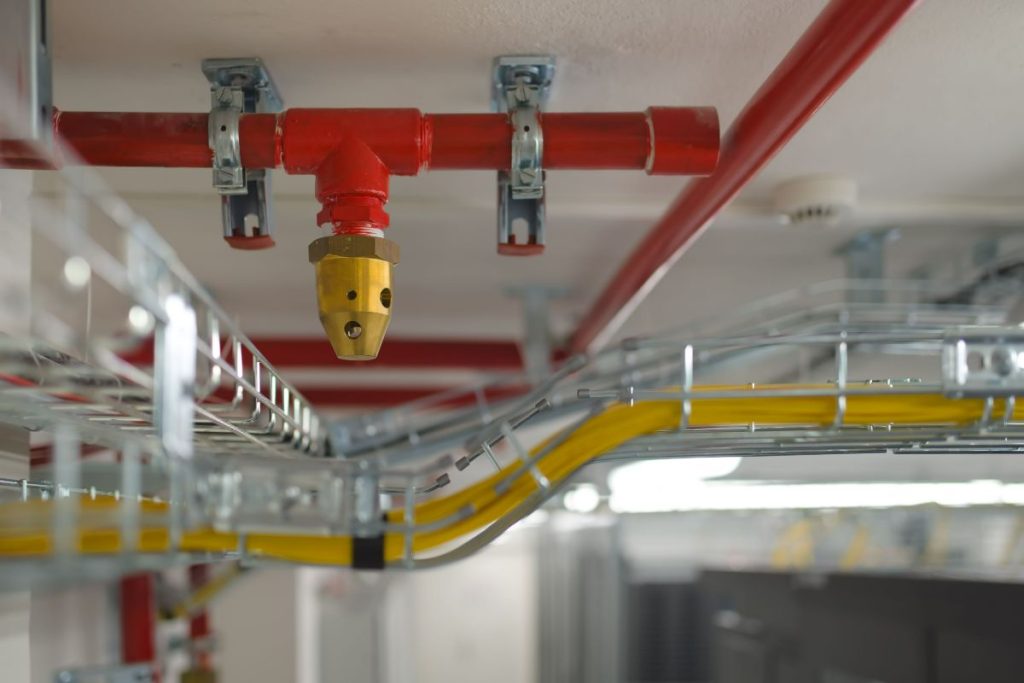What are the benefits of using steel pipes in fire sprinkler systems?
- High heat resistance
- Corrosion resistance
- Versatility
- Cost-effective
- Safety and reliability
Overview
- When it comes to ensuring fire safety, using steel pipes in fire sprinkler systems offers a range of benefits that make them an ideal choice for various applications.
- Supreme Steel Pipe Corporation provides high-quality, heavy-gauge ERW steel pipes designed to withstand extreme heat, corrosion, and mechanical stresses, ensuring their long-lasting reliability.
Ensuring fire safety in any building requires choosing the right materials. Using steel pipes in fire sprinkler systems offer significant advantages. Supreme Steel Pipe Corp., a trusted supplier in the Philippines, provides high-quality steel pipes that meet stringent safety standards for fire protection.
Steel’s exceptional heat resistance makes it an ideal choice for withstanding the extreme temperatures of a fire, letting them do their work when it’s needed most. Their versatility allows them to be used in a variety of building types, from residential homes to large commercial buildings. This article will explore their benefits and highlight why they are the go-to choice for fire protection.
High Heat Resistance
In fire sprinkler systems where high temperatures are typical, heavy gauge ERW steel pipes are necessary since they are made to withstand extreme heat. In the case of a fire, these pipes will not distort or fail since they maintain their strength and structural integrity under heat stress.
ERW pipes are made to meet the strict quality standards needed to prevent fires, maintaining their dependability in high temperatures. Their resistance to thermal expansion and contraction is also a key factor, as it allows the pipes to maintain a sealed system even under fluctuating heat conditions.
These pipes offer reliable protection with heat resistance up to 870°C, particularly in commercial and industrial buildings where fires can produce extremely high temperatures.
Corrosion Resistance
Unlike traditional carbon steel, these pipes are produced with a uniform structure and welded seam that are highly resistant to corrosion, especially when combined with protective coatings. The pipes’ resistance to moisture, chemicals, and other corrosive elements commonly found in fire suppression conditions can be strengthened by applying rust-resistant treatments or coatings.
This durability is essential for preventing leaks or failures in the system, which could compromise fire safety. With proper maintenance and protective coatings, ERW pipes offer superior corrosion resistance, reducing long-term costs and ensuring that the system remains functional.
Versatility
With a broad range of diameters, lengths, and wall thickness, these pipes can be customized to meet specific design requirements. It makes them compatible with different building layouts and fire protection needs. Various fittings like elbows, tees, and reducers can be used to connect the pipes, while integration with materials like PVC or CPVC allows for hybrid systems that optimize performance.
On the other hand, heavy gauge ERW pipes are adaptable to a variety of fire protection strategies, including wet, dry pre-action, or deluge systems, making them suitable for all kinds of installations. Whether residential, commercial, or industrial applications, steel pipes provide reliable and efficient fire suppression, able to handle high flow rates and pressures.
Cost-effective
Compared to other high-performance materials like stainless steel or copper, ERW pipes are significantly more affordable while still providing the required durability and strength. Both large and small-scale fire prevention projects find ERW pipes to be a suitable choice due to their easy manufacturing process, which also reduces production costs.
Installing these pipes is also simple, which lowers labor costs and speeds up project completion for contractors. They are the perfect choice for projects with very limited funds, as they offer excellent performance and safety. Their long lifespan and low maintenance requirements help to further lower overall costs.
Safety and Reliability
Used widely in various industries, these pipes are known for their cost-effectiveness and versatility, making them ideal for many applications. The strength of these pipes is determined by the quality of the weld seam, which must be carefully monitored to avoid any weaknesses.
Regular inspections and non-destructive testing (NDT) are critical in maintaining the pipes’ structural integrity. Manufactured from high-quality steel, heavy gauge ERW pipes are built to endure mechanical stresses and environmental factors, enhancing their long-term reliability.
Though suitable for moderate-pressure applications, they undergo hydrostatic testing to identify any potential weaknesses in the welds before they are put into service.
Supreme Steel Pipe Corp.: Reliable Steel Pipes for Fire Sprinkler Systems
The heavy gauge ERW pipes by Supreme Steel Pipe Corporation are designed to meet the demanding requirements of fire protection, providing long-lasting performance. Made from premium steel, our steel pipes are treated and coated to resist corrosion, which enhances their longevity and overall effectiveness.
Customizable with various end finishes, including threading, swaging, and grooving, they can easily adapt to different installation needs. These are also coated with epoxy and infused with antimicrobial agents, further reducing corrosion and improving the system’s reliability.
Key Takeaway
Using steel pipes in fire sprinkler systems offers superior durability and performance, making them an ideal choice for residential and industrial applications. Choosing us means investing in a high-quality solution that keeps your fire protection system functional and safe. Get in touch with our team today for inquiries.
